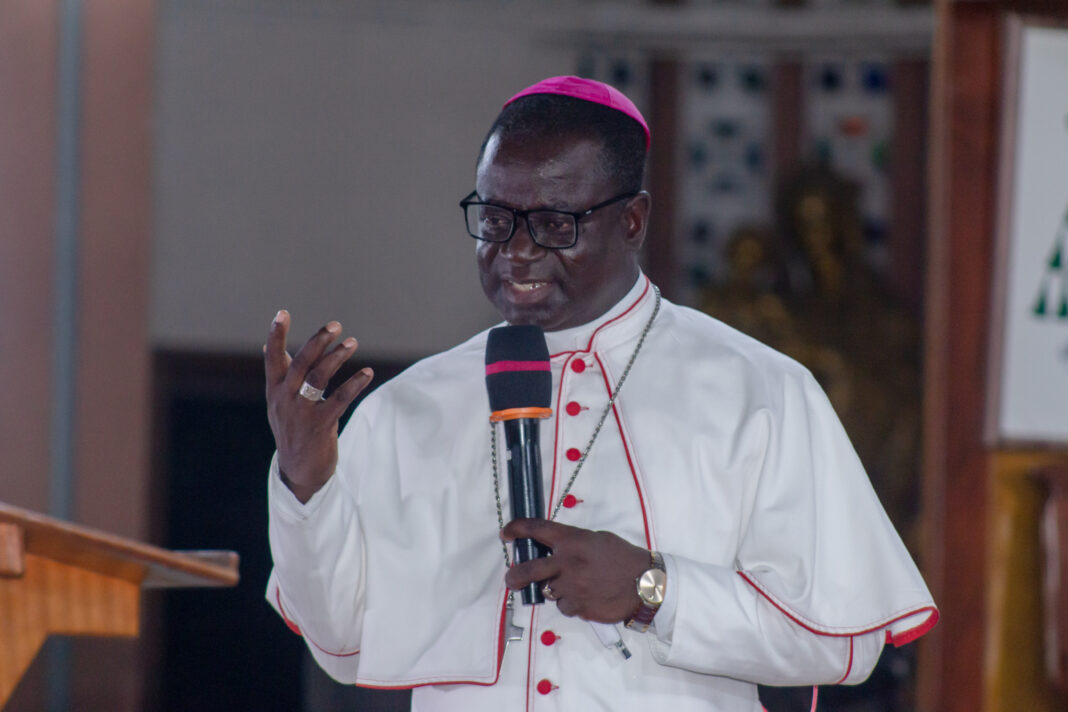KEYNOTE ADDRESS AT THE SIXTH EDITION OF CONVERSATIONS IN THE CATHEDRAL BY MOST REV. SAMUEL NKUAH BOATENG ON WEDNESDAY DECEMBER 4TH 2024 AT THE HOLY SPIRTIT CATHEDRAL , ADABRAKA, ON THE THEME “AND IN HIS NAME, THE NATIONS SHALL HOPE” (MATHEW 12:21): CHRISTMAS AS A MESSAGE OF HOPE FOR GHANA IN THE JUBILEE YEAR.
- Distinguished Chair;
- Your Grace, Most Rev. John Bonaventure Kwofie, CSSp, Metropolitan Archbishop of Accra;
- Your Lordship, Most Rev. John Kobina Louis, Auxiliary of Accra;
- Your Lordship, Most Rev. Anthony Naar Asare, Auxiliary Bishop of Accra;
- My Dear and Beloved Rev Fathers;
- Respected Invited Guests;
- Esteemed Consecrated Men and Women;
- Papal Knights and Dames;
- Knights and Ladies of Marshall;
- Knights of St. John International and Ladies’ Auxiliary;
- Illustrious Organizers of this very important Programme;
- Dear Christ’s Faithful;
- Ladies and Gentlemen;
Peace be with you!
Distinguished Chair,
May I seize the available opportunity to dearly express my heartfelt sentiments of gratitude and appreciation to the organizers of this important program: Sixth Edition of ‘Conversations in the Cathedral’. For making me part of this program I deem it a great honour and an exceptional privilege.
How true it is when my dear brother, Father Patrick Agbeko, in his invitation letter to me described the program as a cornerstone in the Archdiocese’s Spiritual Calendar. I am extremely grateful to you all; undoubtedly, I am highly appreciative of this fraternal gesture.
Distinguished Chair and Dear Christ’s Faithful,
Permit me to present to you the format of my presentation on the theme:
“And in His Name the Nations Shall Hope” (Matt. 12:21): Christmas as a Message of hope for Ghana in the Jubilee year.
Esteemed Chair,
I will strictly follow the traditional format of:
Introduction, Body and Conclusion.
The Introduction will basically focus on an attempt to bring us into focus regarding the atmosphere, the purpose and the brainchild of this very important gathering.
Dear Chair,
In respect of the Body of this presentation, I will share with you the following:
- The context of Matthew 12:21 and its relevance
- I will bring to the fore a bit of exposition of the concept, hope.
- Jubilee Year.
- Christmas
- Christmas and Jubilee and the Message of Hope for Ghana.
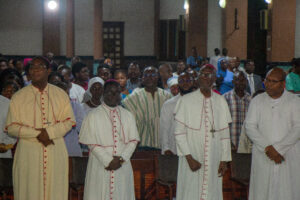
Respected Chair and Dear Christ’s Faithful,
The last bit in connection with the traditional format is the Conclusion. This will concentrate on what is required of us as people of HOPE.
- INTRODUCTION:
CONVERSATION IN THE CATHEDRAL (Focus, Purpose, Brainchild and Commendation).
Dear Chair,
It goes without saying that there is nothing new under the sun; in other words, there is always a forerunner or harbinger for the thoughts, words and deeds of human beings. It is important to state with the greatest of respect that, that which has become a corner-stone in the Archdiocese’s Spiritual Calendar is the Archbishop’s Brain Child. In other words, the brain behind it, though in a very implicit or explicit way, it had existed before. We doff our hats for him for this initiative. It is a NOVELTY! A NOVEL IDEA.
Respected Chair,
It is important to note that the operative word in the phrase “Conversations in the Cathedral” is the word ‘conversations’. This word according to Cambridge Dictionary is about a talk in an informal way between two or more people in which thoughts, feelings and ideas are expressed, questions, asked and answered or news or information is exchanged. In other words, it is a form of communication that informs, educates/teaches and entertains as well.
Dear Chair,
It is important to note that conversations, engagements and interactions can take place in an any open space or close space. Truth be told, that the place or venue of conversations can determine the worth or value of that particular conversation. Though literally, every conversation appears to be mostly private or informal. Contextually, the type of conversation you are talking about take place in the cathedral: the principal church of a diocese, with which the bishop is officially associated; or, that is the official seat of a diocesan Bishop.
Dear Chair,
Permit me to say that this practice is a novelty in the church in Ghana which might have drawn its inspiration from the following:
(POSSIBILITIES).
- The practice of the Pope speaking “Ex Cathedral”, literally speaking from his Chair, in matters of faith and morals.
- Jesus’ public ministry, specifically the proclamation of the saving word was not limited to the four corners of a structure; the Sermon on the Mount (Matt. 5-7). From where he sat presumably, Cathedral). He proclaimed the gospel message to the people of his time.
- The Chair of the Chancellor or the Vice Chancellor or University Chair. The Academic Chair is the symbol of Authority and power or Position.
- Every February 22nd, we celebrate the feast of the Chair of Saint Peter.
Respected Chair, it is a conversation which is interactive. It inspires and encourages. It seeks to answer questions, it creates a synodal spirit for people to walk together in conversation towards the mission and vision of the Church.
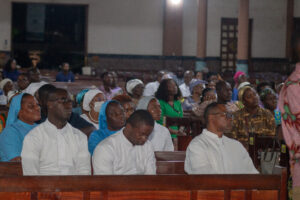
- BODY
THE CONTEXT OF MATHEW 12:21 (AND IN HIS NAME THE GENTILES WILL HOPE).
Esteemed Chair,
Contextually, Matthew summarizes Jesus’ healing activities. This quotation is taking from Isiaih 42:1-4 from the first song of the Suffering Servant of God. The prophecy speaks of God’s love for the Servant. The Servant is spirit-filled. The images reflect His gentle, quiet, care for the weak, the discouraged, the hurt, etc. Mathew 12:21 is a fulfilment of the prophecy of the prophet Isiah because in his name the disadvantaged find hope: Jesus is the Hope of the Nations, not just those in Israel but for people across the globe. Just the mere mentioning of His name fills our heart with hope and joy. It is the desire of God that everyone is saved and will come to the knowledge of the truth (1st Timothy 2:4). In other words, in the name of Jesus the Gentiles will hope. With Jesus, there came into the world the invitation, not to a nation but to all men, to share in and to accept the love of God. In Him God was reaching out to everyone with the offer of His love: Offer of Inclusivity and not Exclusivity.
MEANING OF THE CONCEPT HOPE
Dear Chair,
Hope is a theological virtue by which we desire the kingdom of heaven as our happiness, placing our trust in Christ’s promises and relying not on our own strength, but on the grace of the Holy spirit. Hope allows the possibility of Christians to trust in God, especially with things that seem difficult or impossible to receive. It sustains us at all time with the truth that Jesus will always remain with us, even when all reason for hope seems absent. It keeps us from discouragement and leads us to persevere in prayer. It offers to us joy and courage, and sustains us in time of trial. It allows us to live, grow and persevere in faith. As a religious concept hope rest entirely in Yahweh, the Hope of Israel (Cf. Jeremiah 14:8; 17:13). Biblical hope not only desire something good for the future, but also, most importantly, it expects it to happen.
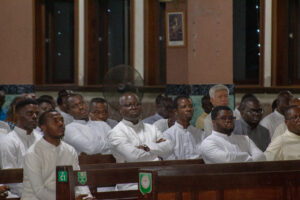
THE JUBILEE YEAR
Revered Chair,
The concept of Jubilee originated in the bible, where it was a year of celebration and liberation that took place after every fifty years. Jubilee was hence the name given to a particular year. The name originates from the Hebrew word yobel which means “ram’s horn”. The yobel was the instrument blown to mark the launch of the Jubilee year. We can find an early indication of it in the bible (cf. Leviticus 25:8-13). It was intended to be marked as a time to reestablish a proper relationship with God, with one another and with all of creation; it involves the forgiveness of debts; liberation of slaves, the giving of land to their rightful owners, as God was considered the true owner of the land.
In the history of the church in 1300, Pope Boniface VIII called the first Jubilee also known as a “Holy Year”. The frequency of Holy year has change overnight. At first it was celebrated every 100 years. Later in 1343 Pope Clement VI reduced the gap between Jubilees to every 50years; and in 1370 Pope Paul II made it every 25years. There have also been “extraordinary” Holy years: for example, in 1933 Pope Pius XI chose to commemorate the 1900th anniversary of the redemption and in 2015 Pope Francis proclaim the year of Mercy as Extraordinary Jubilee year. The year of which Jubilee years are marked has also changed through the centuries. Originally the Holy year consisted of a pilgrimage to the Roman Basilicas of Saint Peter and Saint Paul. Other signs were added such as the Holy Door. It is an occasion to promote faith, charity and forgiveness. By participating in the Holy year, Catholics renewed their spiritual commitment and received Plenary or partial Indulgences.
Distinguished Chair,
In the ancient Jewish traditions, and as attested by the bible in Leviticus 25, there was a year of special universal pardon and liberation during which slaves, prisoners and debtors were liberated and the mercy of God was manifested in a special way. This special year occurs every fifty years. It occurs at least once in the life time of most individuals. This special year was called Jubilee year.
You shall hallow the fiftieth year and proclaim liberty throughout the land, to all its inhabitants; it shall be a Jubilee for you when each of you shall return to His property and each of you shall return to his family. This fiftieth year is to be a Jubilee year for you. The Jubilee is to be a Holy thing to you. And you will eat what comes from the field. Lev 25: 10-14. The trumpet with which the particular year was announced was a goat horn called yobel in Hebrew hence the origin of the word (Jubilee). The celebration of this year also includes the restitution of land to the original owners, the remission of debts, the liberation of slaves and the land was to be left fallow.
The Catholic Jubilee year was instituted on the model on the Old Testament Jubilee in which, every fifty years, the Hebrew celebrated a year of perfect rest and emancipation. Pope Boniface VIII established the Holy year in 1800 as a centenary observance. In 1342 Clement VI reduce the interval to fifty years, and in 1470 Paul II further reduced it to twenty-five years.
A Jubilee can be ordinary if it falls after the said period of years and extraordinary when it is proclaimed for some outstanding events. There had been twenty-six ordinary Holy Year so far. The year 2000 was the twenty-sixth ordinary Jubilee and that of 2025 will be the twenty seventh. The custom of calling “extraordinary Jubilee began in the sixteenth centuries and they can vary in length from a few days to a year.
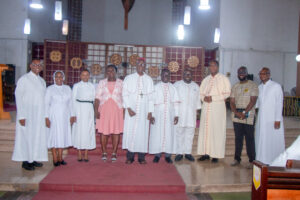
CHRISTMAS AND JUBILEE A MESSAGE OF HOPE FOR GHANA
As a nation, especially, in this Jubilee year, we see reasons for Being grateful to God. We as a nation are blessed with abundance resources, rich cultural heritage, a resilient people and peace. We cannot just regard these as our right and not show gratitude to God for them.
In spite of the many good things, we have been blessed with we are face with many challenges. Some of these challenges are, unemployment, environmental degradation, especially the ‘Galamsey’ menace, economic hardship, political divisions, religious extremism, false prophecies, bribery and corruption. These realities often leave many Ghanaians, especially the youth, feeling hopeless and on the verge of disillusionment. However, we would not just allow these challenges to overshadow all the good things we have been endowed with.
In a country filled with challenges, uncertainties, and struggles, the birth of Christ stands as a beacon of hope, light and renewal. Just as the nation of the world are drawn to His light, Ghana is included in this promise. The name of Jesus offers us hope for peace, unity and prosperity.
The birth of Jesus signifies the assurance of God’s purpose to redeem humanity. It reminds us that no matter the challenges we face, be it economic struggles, political tensions, or social hardships, Christs’ coming assures us of the renewal and restoration. Christmas, thus invites us to pause and reflect, not in despair, but with faith that Christ’s birth is a promise, that God is with us to redeem us in every situation.
Beyond its religious significance, Christmas carries universal themes of renewal, generosity and unity. It invites people to reflect on the possibilities of peace, kindness and goodwill towards all. The traditions of giving, sharing and coming together with loved ones reinforce the idea that even small acts of love and compassion can brighten lives and inspires optimism.
The Christmas story, centred on humble beginnings, also reminds us that hope often emerges in unexpected places. Whether through acts of charity, reconciliation, or simply cherishing time with family, Christmas encourages us to believe in the promise of better days and the enduring power of love to transform our Country.
CHRISTMAS AS A MESSAGE OF HOPE\THEORIES
Christmas is one of the commemorative feasts of Jesus Christ instituted by the church. In antiquity, most cultures celebrated the winter solstice, the moment during the year when the sun is furthest south in the northern hemisphere (December 21st or 22nd). In ancient Rome, this festival was called the Saturnalia and run from December 17th to December 24th. During that week no work was done and the time was spent in parties, games, gift giving and decorating the houses with evergreens. Slaves were dignified and that was the only moment that slaves were considered to be good as their masters. It was the periods when the wide gaps were bridged, diversities were respected and unity, love and peace embraced. This celebration was a day of hope and joy for everyone especially slaves, the marginalized and the poor. This feast was followed on December 25th by the Brumalia, the feast of the shortest day of the year, the feast day of the new sun, the last of the old. With the emerging of Christianity, this hopeful and love centred feasts were taking over by Christians and replaced by the birth of Christ the son of righteousness whom the early Christian identified as the son in heaven.
In the fourth century, before the nativity was allotted a day of it own the sixth of January was regarded as at once the birth and baptismal day of Jesus in believers’ minds, with the celebration of the baptism of the lord, was to celebrate both his canal and spiritual birth. The fusion of the two celebrations brought some difficulties and confusions. As attested by a letter by Cyril bishop of Jerusalem, to Julius who was Pope of Rome 337AD-352AD and is preserve by John of Niche.
Christmas day began to be observed separately towards the middle or the end of the fourth century.
John Chrysostom made a remark in one of his homilies which he preaches at Antioch which helps us to approximate the date at which Christ was first kept in the important Christian centre of Antioch. He called the feast the birthday of Christ after the flesh. Thus, we know that Christmas or feast of the birth of Christ was observed in Antioch the oldest Christian centre outside Jerusalem around 376AD. In Rome the date on which Christmas was first celebrated is difficult to ascertain, however historical records attest that as at 366AD it has existed already. Even in those times Christmas brought Christians to an optimistic state of the mind based on an expectation that things can get better tomorrow no matter how tough they seem in those days.
At this point in the state of our country, redemption is of keen interest as we stand the chance of losing lives and facing serious challenges now and in the near future based on our own attitudes and actions which are detrimental to our common good as a nation. Where is our hope as we destroy our lands all in the name of seeking riches in an unjust manner, engaging in human trafficking, and other activities that demean the humble dignity which is a gift from God. As we commenced this twenty seventh Jubilee year in all of it solemnity and holiness we are encouraged to embark on economic, cultural, environmental, communal and attitudinal reset. This is what was recommended for the Jewish people: “You shall hallow the fiftieth year and proclaim liberty throughout the land, to all its inhabitants; it shall be a Jubilee for you when one of you shall return to his property and each of you shall return to his family. This fiftieth year is to be a Jubilee year for you…. The Jubilee is to be a Holy thing to you, you eat what comes from the fields” Leviticus 25:10-14. This year is a wake-up call on all of us as Ghanaians to change our hearts, mind and attitudes and be charitable to our land, environment, future generation and refurbished what we have already destroyed. Nobody will do it for us if we don’t wake up and do it ourselves.
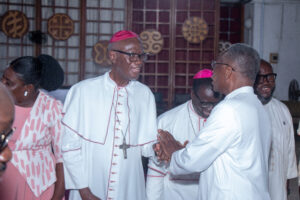
In scriptures the first Christmas was declaration of Goodnews for everyone. It was hope for shepherds and wise men alike, it was the hope that God hadn’t forgotten about the world he made. The name Jesus from the Biblical Hebrew context, Yeshuah, really means salvation, victory for deliverance. As Christians we believe that you will be rescued from hopelessness because of the coming of Jesus into the world and in his name, you are saved. This is a year of change: this is a year of salvation for our nation Ghana.
WHAT THE HOPE OF CHRISTMAS TEACHES US AS GHANAIANS
Christmas has behaviours and attitudes it instils in us as citizens of Ghana, and more importantly at this crucial period when the church celebrates a Jubilee year. This is a “kairos” moment when we must reconnect with our Creator, and with ourselves as a family with a common purpose and destination; seeking forgiveness and reconciliation.
The hope of Christmas in the Jubilee Year is:
A Call to Faith
One very important message of hope in the Christmas season is that it calls humanity to faith. In this sense, we encounter a \God who always fulfils His promises (Psalm 105: 8). Christmas gives us the certainty and the assurance that we can have faith in God. In Him, we find the strength to persevere, the courage to face difficulties, and the assurance that His plans for us as a country is, not only just good, but the best. This call to faith compels us to trust that God is alive and is still God, even in our most difficult moments; for His name represents power, healing and victory over despair.
A Call to Unity
Christmas teaches us the importance of unity. Just as Christ came to reconcile humanity to God, we are called to reconcile with one another. Our strength as a country lies in our unity. Ethical, political, or social differences must not divide us, but rather enhance our togetherness and unity in diversity; “for in Christ’s name, we are one people” (Gal 3:28). The hope of Christmas enjoins us to seek for peace even at places where we cannot find it. It is also a call to seek for collaboration and understanding across all sectors and communities.
A Call to Action
Hope is not passive, it requires action. The message of Christmas challenges us to be agents of change in our communities. Whether through acts of kindness, supporting the venerable, or promoting justice, we embody hope when we live out Christ’s teaching. This season reminds us to care for the less fortunate.
In every community, there are those in need of food, shelter, or encouragement. We are called in this season to be the hands and feet of Christ. We are called to be charitable, not only with material things but with our words also.
A Call to a Commitment to Change
The hope of Christmas calls all Ghanaians to be committed to bringing positive change. We must not be content with mediocrity but seek and work towards bringing about good results. This is the good time to reflect on the harm we have done to nature ant work to reverse it. We cannot be praying the “Maranatha” when we have no room to accommodate Him when he comes. We must realize that all the harm done to the environment comes back to us in manifolds. We must put proper measures in place to solve all the environmental degradations.
Christmas call for personal and collective responsibility to create positive change, no matter how small. This is not the time for pointing fingers at the other person. We must realize that we all have a part to play in this endeavour. We are all involved to make our common home better than how it is now.
Building a Better Future
The hope of Christmas inspires us to work for a brighter tomorrow. This season teaches us that although we do not know what lies ahead, we are sure that the future is bright. With this in mind, we need to prepare ourselves for this brighter future. This includes raising strong families, investing in the education of our children, preserving the environment in order to bequeath it to the future generations, and been honest and diligent in our work. The brighter future must not come to meet us unprepared. We must do our possible best to work towards it and receive it when it finally comes.
CONCLUSION
As we celebrate Christmas and the Jubilee year, let us remember that the hope we have in the birth of Christ is not limited to only the salvation of the Israelites. It is a hope also for Ghana (cf Titus: 2:11). His birth is the beginning of a new story for humanity and it can also be the beginning of a renewed hope for Ghana. God is not done with our Country yet; he is not fed up with us and we must not be fed up as a Country. However, we need to have that “metanoia” which John the Baptist preached about. This would help us stand a worthy position to receive good things from God. His name carries the promise of peace, progress and prosperity for our land.
God bless the Catholic Archdiocese of Accra!
God bless the Catholic Church in Ghana!!
God bless our Dear Nation Ghana and fill us with HOPE.!!!

